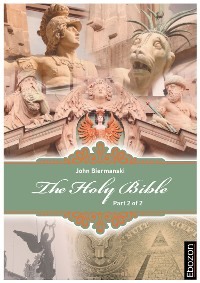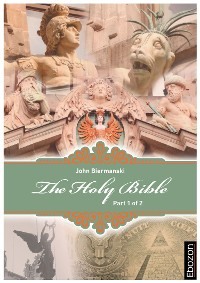
Полная версия
The Sacred Scriptures - 29th Special Edition (Part 4/4)
[Editor: Für alle gläubigen Mohammedaner, worunter auch viele Freunde von mir sind und ich auch viele gute und überaus sehr gastfreundliche und liebevolle Menschen in der Türkei kenne, ist dies die Aussage aus biblischer Sicht. Denn der Koran sagt, dass Jahschua nicht gestorben ist, sondern so getan hat als ob er gestorben wäre. Wer das System und die Arbeitsweise der Soldaten Roms, des römisches Reichsheers kennt, weiß ganz genau, dass ein zum Tode verurteilter Mensch nicht mehr lebendig aus den Händen der Henker kommen wird. Der Jesus am Kreuz in den Kirchen und außerhalb ist NICHT der Jesus [Jahschua] der Heiligen Schrift. Die Römer haben den Sohn G-ttes sprichwörtlich in ihrem Heerlager in Jerusalem zerfleischt. Benutzt wurden von ihnen Striemen/Peitschen, die mit Steinen und ähnlichem Material versehen waren. Diese Steine hatten aber eine besondere Verarbeitung: Sie waren mit WIDERHAKEN versehen, die die Haut oder sogar ganze Körperteile stark beschädigten. Ein bestialisches Werkzeug in den Händen der Knechte Satans. Beim Auspeitschen wurde 40 minus EINS gezählt, damit der ihnen Ausgelieferte noch eine kurze Zeit am Leben blieb; bei 40 stirbt der Mensch innerhalb kürzester Zeit. Nicht zu vergessen: ROM hat den Messias/den Gesalbten JAHWEH‘s aufgrund der Auslieferung der hohen, judäischen Religionsführer Jerusalems getötet. ABER, das ist das SCHÖNE ABER: JAHWEH, der Allmächtige und lebendige Elohim (G-tt), hat seinen Gesalbten am dritten Tage von den Toten auferweckt, der jetzt seit 1844 als Hoherpriester im himmlischen Allerheiligsten für uns als Fürsprecher vor dem Angesicht JAHWEH’s steht! - So sollen WIR an den SOHN G-TTES glauben, denn G-tt unser himmlischer Vater sprach über ihn: JAHWEH hat zu mir gesprochen: „Du bist mein Sohn, heute habe ich dich gezeugt.” (Psalm 2,7; siehe auch Psalm 89; Sprüche 8,24.25). Welches Urteil ergeht über uns, wenn wir JAHWEH’s Wort missachten und verwerfen, indem wir sagen, er hat nicht seinen Sohn gesendet, nur einen Propheten. Dann machen wir den Allmächtigen zum Lügner, der selbst bezeugt hat, dass er seinen Sohn gezeugt und für uns hingegeben hat. Ein Schattenbild dafür ist der Opferungsvorgang des Sohnes Abrahams mit Namen Isaak vorgenommen durch Abraham selbst, indem der Engel JAHWEH’s Abraham in der letzten Minute von der Opferung seines Sohnes Isaaks abhielt (1. Mose 22). Welches Urteil wird gegen uns gefällt, wenn wir den Sohn Elohims (G-ttes) selbst zu G-tt machen? DANN haben wir JAHWEH Zebaoth (Elohim), unseren liebevollen Vater im Himmel, NICHT erkannt! Denn wie kann ein G-tt einen anderen G-tt zeugen? Wie kann ein G-tt kleiner sein als ein anderer G-tt? Was für Irrlehren, die dazu dienen, eine Verstümmelung der Persönlichkeit JAHWEH's, das Verhältnis zu seinem Sohn und seines Erlösungsplanes durchzuführen. Wehe dem Menschen, der etwas dem Wort JAHWEH's hinzufügt oder hinweg nimmt!]
Mohammed hat zwar Offenbarungen gehabt, aber sie waren nicht göttlichen Ursprungs; die Weissagung bezeichnet sie als „Rauch aus dem Schacht” des Abgrundes (9.2). - Zitat: Der Mohammedanismus wird kurz gekennzeichnet als „versteckte Brutalität unter dem Schleier der ‘wahren’ Religion” (aus: „Prophet” aus der Wüste - Mohammed, von Chr. + Th. Schirrmacher). Johannes aber sieht unter dem Bilde von Heuschrecken die gewaltigen Reiterscharen der Araber (9,3). Sie sollten aber nicht den Pflanzenwuchs schädigen, sondern nur die Menschen, die nicht das Siegel Gottes hatten, nämlich die Götzenanbeter und Bilderverehrer (9,4). Sie sollten auch nicht die Menschen töten, sondern quälen und zwar fünf Monate lang. Diese fünf Monate sind als prophetische Zeit von 150 Jahren zu verstehen (9,5), nämlich vom Jahre 622 n. Chr., dem Jahre der Flucht Mohammeds von Mekka nach Medina, bis 772, dem Jahre der Gründung des Kalifats von Bagdad. Die fünf Monate prophetischer Zeit finden wir noch einmal angegeben (9,10). Zahlreiche Ausleger sehen den Beginn dieser 150 Jahre am Tage der Schlacht bei Baephum, nahe Nikomedia, am 27. Juli 1299. Dies war der erste Angriff der Türken auf das oströmische Kaiserreich. Am Ende dieser fünf prophetischen Monate, 1448, hatte ein neuer Kaiser von Byzanz, Konstantin Paläologus, den türkischen Sultan Murad II. um Erlaubnis der Thronbesteigung ersucht. Die Krone hat er erst am 6. Januar 1449 empfangen, nachdem die gewünschte Erlaubnis vom Sultan gegeben worden war. Das oströmische Kaiserreich hatte seine Unabhängigkeit verloren und war abhängig von den Mohammedanern. Die fünf Monte prophetischer Zeit endeten am 27. Juli 1449, dem Beginn der sechsten Posaune.
Explanation of Ernst Simon:
The fifth trumpet finds its fulfilment in Mohammedanism, symbolically represented by the “sky fallen star” (9:1). G-d had punished the apostate Christendom of the West in the Western Roman Empire by the Germans and the Huns, but also the Eastern Christianity had become subject to judgement, and in G-d’s hands the Mohammedans were breeding rods for the apostate Christians of the Eastern Roman Empire. Mohammedanism is a pernicious heresy, in the biblical point of view it is not a religion at all, because it does not teach salvation from sins and does not know any saviour. Mohammed’s/Muhammad's teaching knows Jesus [Yahshua], but does not believe in him as in the Son of G-d... recognizing him as one of the major prophets, the sinless Son of G-d Jesus [Yahshua] is subordinated to the sinner Mohammed/Muhammad. Without the teaching of salvation Mohammedanism is not a religion, but only a social system, a brotherhood.
[Editor: For all faithful Muslims, including many of my friends and many very good and extremely hospitable and loving people in Turkey whom I know, this is the statement from a biblical point of view. For the Koran says that Yahshua did not die, he pretended being dead. Those who know the system and the functioning of the soldiers of Rome and the Roman imperial army know very well that a man condemned to death will hardly come out alive of the hands of the executioner. Jesus on the cross both inside and outside the churches is NOT the Jesus [Yahshua] of the Holy Scripture. The Romans have literally torn the Son of G-d into pieces in their camp in Jerusalem. They used welts/whips, furnished with stones and similar material. These stones were however processed in a special way: they were fitted with BARBED HOOKS, which severely damaged the skin or even the entire parts of body - a brutal tool in the hands of Satan’s servants. On whipping it was counted 40 minus ONE so that the extradited remained alive for a while, at 40 a person dies within a short time. One cannot help mentioning the fact that ROME killed the Messiah/the Anointed of YAHWEH because he was delivered by high Judean religious leaders of Jerusalem. That’s all GOOD BUT: YAHWEH, the Almighty and living Elohim (G-d), raised his anointed from the dead on the third day, who has been standing as the High Priest before YAHWEH’s face in the heavenly sanctuary for us as an advocate since 1844! - So should WE believe in the SON OF G-D, because G-d, our heavenly father spoke of him: YAHWEH spoke to me: “You are my Son, I have begotten you today.” (Psalm 2:7; see also Psalm 89, Proverbs 8:24-25). Which judgement are we subjected to if we disobey YAHWEH’s Word and reject it by saying that he had sent not his Son, but only a prophet? Then we make the Almighty a liar, who testified that he had begotten his son having given him to us. A shadow image of this is the process of sacrifice of Abraham’s son named Isaac by Abraham himself where in the last minute of the sacrifice YAHWEH’s angel held Abraham from sacrificing his son Isaac (Genesis 22). What judgement will be fallen upon us, if we make the Son of Elohim (G-d) to G-d? THEN we have NOT recognized YAHWEH Sabaoth (Elohim) our loving Father in heaven! For how can a G-d beget another G-d? How can a G-d be smaller than another G-d? What a heresy, which serves to carry out the mutilation of YAHWEH’s personality, his relationship with his Son and his plan of salvation. Woe to the person who adds to or takes anything out of the word of YAHWEH!]
Although Mohammed//Muhammad had revelations, they were not of divine origin; the prophecy describes them as “smoke from the shaft” of the abyss (9:2). - Quote: Mohammedanism is aptly characterized in short as “brutality hidden beneath the veil of ‘true’ religion” (from “Prophet” from the Desert - Mohammed, by Chr. + Th. Schirrmacher). However, under the image of raiders John sees the mighty cavalry of the Arabians (9:3), whereas they did not have to damage the vegetation, but only people who had not the seal of G-d, namely, idolaters and worshipers (9:4). They also did not have to kill people, but torture them and that for five months. These five months are to be seen as a prophetic period of 150 years (9:5), namely from the year 622 AD, the year of Mohammed’s/Muhammad's escape from Mecca to Medina, until 772, the year of establishment of the Caliphate of Baghdad. The five months of prophetic time are indicated again (9:10). Many interpreters see the beginning of these 150 years on the day of the battle of Bithynia near Nicomedia on 27th July 1299. This was the first attack of the Turks on the Eastern Roman Empire. At the end of these five prophetic months, in 1448, a new Byzantine emperor, Constantine Palaiologos, asked the Turkish Sultan Murad II for accession. The crown was received on 6th January 1449 after the desired permission had been granted by the Sultan. The Eastern Roman Empire had lost its independence and became dependent on the Muslims. The five months of the prophetic period ended on 27th July 1449, on the sounding of the sixth trumpet.
Rev./Offb. 9,13 Und der sechste Engel posaunte: und ich hörte eine Stimme aus den vier Ecken des goldenen Altars vor JAHWEH,
KJV + EL = And the sixth angel sounded, and I heard a voice from the four horns of the golden altar which is before YAHWEH.
Kap 8,3; 2. Mose 27,2; 30,1-3
Rev./Offb. 9,14 die sprach zu dem sechsten Engel, der die Posaune hatte: Löse die vier Engel, die gebunden sind an dem großen Wasserstrom Euphrat.
KJV + EL = Saying to the sixth angel which had the trumpet. Loose the four angels which are bound in the great river Euphrates.
Kap 16,12
Rev./Offb. 9,15 Und es wurden die vier Engel los (gebunden), die bereit waren auf die Stunde und auf den Tag und auf den Monat und auf das Jahr, daß sie töteten den dritten Teil der Menschen.
KJV + EL = And the four angels were loosed, which were prepared for an hour, and a day, and a month, and a year, to slay/kill the third part of men.
Kap 8
Rev./Offb. 9,16 LUTHER + MENGE = Die Zahl der Scharen des Reiterheeres war viel tausend Mal tausend; und ich hörte ihre Zahl.
KJV + EL = And the number of the army of the horsemen were two hundred thousand thousand (as twice ten thousand times ten thousand): and I heard the number of them.
Rev./Offb. 9,17 Und also sah ich die Rosse im Gesicht und die daraufsaßen, daß sie hatten feurige und bläuliche und schwefelige Panzer; und die Häupter der Rosse waren wie die Häupter der Löwen, und aus ihrem Munde ging Feuer und Rauch und Schwefel.
KJV + EL = And thus I saw the horses in the vision, and them that sat on them, having breastplates of fire, and of jacinth (hyacinth), and brimstone: and the heads of the horses were as the heads of lions; and out of their mouths issued fire and smoke and brimstone.
Rev./Offb. 9,18 Von diesen drei Plagen wurde getötet der dritte Teil der Menschen, von dem Feuer und Rauch und Schwefel, der aus ihrem Munde ging.
KJV + EL = By these three was the third part of men killed, by the fire, and by the smoke, and by the brimstone, which issued out of their mouths.
Rev./Offb. 9,19 Denn ihre Macht war in ihrem Munde; und ihre Schwänze waren den Schlangen gleich und hatten Häupter, und mit denselben taten sie Schaden.
KJV + EL = For their power is in their mouth, and in their tails: for their tails were like to serpents, and had heads, and with them they do hurt.
Rev./Offb. 9,20 Und die übrigen Leute, die nicht getötet wurden von diesen Plagen, taten nicht Buße für die Werke ihrer Hände, daß sie nicht anbeteten die Dämonen und goldenen, silbernen, ehernen, steinernen und hölzernen Götzen, welche weder sehen noch hören noch wandeln können;
KJV + EL = And the rest of the men which were not killed by these plagues yet repented not of the works of their hands, that they should not worship demons, and idols of gold, and silver, and brass (bronze), and stone, and of wood: which neither can see, nor hear, nor walk:
Kap 16,9
Rev./Offb. 9,21 und taten auch nicht Buße für ihre Morde, Zauberei, Hurerei und Dieberei.
KJV + EL = Neither repented they of their murders, nor of their sorceries, nor of their fornication, nor of their thefts.
Erklärung von Ernst Simon:
Mit dem Lösen der vier Engel erfolgte für mehrere Jahrhunderte erneut ein unaufhaltsames Vordringen der Mohammedaner (9,13.14). Bereits 1453 wurde Konstantinopel erobert, später große Teile Europas und ganz Nordafrika. 1529 waren die Türken vor Wien und erst nach der Niederlage bei der zweiten Belagerung Wiens 1683 ging die türkische Flut langsam zurück. Stunde, Tag, Monat und Jahr verstehen verschiedene Ausleger als prophetische Zeit von 391 Jahren und 15 Tagen (9,15). Vom 27. Juli 1449 an gerechnet (Beginn der 6. Posaune), führt diese Zeit zum 11. August 1840. In jenen Tagen war die Aufmerksamkeit der Welt auf Ereignisse in der Türkei gerichtet. Am 11. August 1840 übergab nämlich der türkische Abgesandte Rifat Bey dem ägyptischen Pasche Mohammed Ali ein Memorandum. Die Türkei unterstellte sich den vier Großmächten England, Österreich, Preußen und Rußland. In diesem Ereignis ist die zeitlich genaue Erfüllung der Weissagung deutlich zu erkennen. Die Türkei verlor ihre Unabhängigkeit und war von den vier Großmächten abhängig, so wie zu Beginn der 6. Posaune das oströmische Kaiserreich seine Unabhängigkeit verlor und von den Türken abhängig geworden war (siehe Erklrg. zu 9,10). - Feuer, Rauch und Schwefel (9,17.18) werden auf Schusswaffen und Artillerie gedeutet, die zu jener Zeit in Anwendung kamen. - „... bereit, ... um zu töten.” Durch das Vordringen der Türken und die Kreuzzüge wurden Millionen [von] Menschen getötet. Auch die Mongolen waren grausame Eroberer; der schlimmste unter ihnen sicherlich Timurlenk. Er ließ 4.000 armenische Reiter lebendig begraben, 1387 in Ispahan 70.000 Perserköpfe zu Türmen aufbauen, und 1401 musste in Bagdad eine Siegespyramide von 90.000 Menschenköpfen aufgerichtet werden. Die Christenheit hat aber leider aus den furchtbaren Bedrängnissen durch die Mohammedaner in der vergangenen Jahrhunderten nichts gelernt, wie die Prophetie dies deutlich zum Ausdruck bringt (9,20.21).
Explanation of Ernst Simon:
With the release of the four angels, an unstoppable encroachment of the Mohammedans began anew and lasted several centuries (9:13-14). Already in 1453 Constantinople was conquered, followed by large parts of Europe and North Africa. In 1529 the Turks reached Vienna, and after the defeat in the second siege of Vienna in 1683 the Turkish flow went back slowly. The hour, the day, the month and the year are defined by different interpreters as a prophetic period of 391 years and 15 days (9:15). Counted from 27th July 1449 (sound of the sixth trumpet), this time period indicates 11th August 1840. In those days world’s attention was focused on the events in Turkey. On 11th August 1840 the Turkish delegate Rifat Bey handed a memorandum to Mohammed//Muhammad Ali of Egypt. Turkey was submitted to four major powers: England, Austria, Prussia and Russia. The exact time fulfilment of the prophecy is clearly visible in this event. Turkey lost its independence and became dependent on the four major powers. As the 6th trumpet sounded, the Eastern Roman Empire lost its independence and had become dependent from the Turks (see explanation to 9:10). - Fire, smoke and sulphur (9:17-18) are interpreted as firearms and artillery, which came into use at that time. - “... ready... to kill. “Millions [of] people were killed due the Turkish invasions and the Crusades. Also the Mongols were cruel conquerors; Tamerlane (Timur) was certainly the worst among them. On his order, 4000 Armenian horsemen were buried alive, in 1387, 70,000 heads of Persians were built to towers in Isfahan, and in 1401 a victory pyramid of 90,000 human heads had to be erected in Baghdad. The prophecy however expresses clearly that Christianity has unfortunately learned nothing from terrible afflictions by the Muslims over the past centuries (9:20-21).
Chapter/Kapitel 10
Der Engel mit dem Büchlein.
The angel with the little book.
Rev./Offb. 10,1 Und ich sah einen anderen starken Engel vom Himmel herabkommen; der mit einer Wolke (= Engelschar) bekleidet, und ein Regenbogen auf seinem Haupt und sein Antlitz wie die Sonne und Füße wie Feuersäulen.
KJV + EL = And I saw another mighty angel come down from heaven, clothed with a cloud: and a rainbow was upon his head, and his face was as it were the sun, and his feet as pillars of fire:
Rev./Offb. 10,2 Und er hatte in seiner Hand ein Büchlein aufgetan. Und er setzte seinen rechten Fuß auf das Meer und den linken auf die Erde;
KJV + EL = And he had in his hand a little book open: and he set his right foot upon the sea, and his left foot on the earth,
Rev./Offb. 10,3 und er schrie mit großer Stimme, wie ein Löwe brüllt. Und da er schrie, redeten sieben Donner ihre Stimmen.
KJV + EL = And cried with a loud voice, as when a lion roars: and when he cried, the seven thunders uttered their voices.
Hos 11,10; Amos 1,2; Jer 25,30
Rev./Offb. 10,4 Und als die sieben Donner geredet hatten, wollte ich es aufschreiben. Da hörte ich eine Stimme vom Himmel zu mir sagen: Versiegle, was die sieben Donner geredet haben, und schreib es nicht auf!
KJV + EL = And when the seven thunders had uttered their voices, I was about to write: and I heard a voice from heaven saying to me, Seal up those things which the seven thunders uttered, and write them not.
Dan 12,4.9; Ps 29
Rev./Offb. 10,5 Und der Engel, den ich stehen sah auf dem Meer und auf der Erde, hob seine (rechte) Hand auf zum Himmel
KJV + EL = And the angel which I saw stand upon the sea and upon the earth lifted up his hand to heaven,
Rev./Offb. 10,6 und schwor bei dem Lebendigen von Ewigkeit zu Ewigkeit, der den Himmel geschaffen hat und was darinnen ist, und die Erde und was darinnen ist, und das Meer und was darinnen ist (= das sind die Merkmale des Siegel GOTTES im Sabbatgebot, siehe 2. Mose 20,8-11), daß hinfort keine Zeit mehr sein soll;
KJV + EL = And swore by him that lives forever and ever, who created heaven, and the things that therein, and the earth, and the things that therein are (in it), and the sea, and the things which are therein, that there shall be time no longer:
Dan 12,7
Rev./Offb. 10,7 sondern in den Tagen der Stimme des siebenten Engels, wenn er posaunen wird, soll vollendet werden das Geheimnis Elohims (Gottes), wie er hat verkündigt seinen Knechten, den Propheten.
KJV + EL = But in the days of the voice of the seventh angel, when he shall begin to sound, the mystery of Elohim (God) should be finished, as he has declared to his servants the prophets.
Kap 11,15; Apg 3,21
Rev./Offb. 10,8 Und ich hörte eine Stimme vom Himmel abermals mit mir reden und sagen: Gehe hin, nimm das offene Büchlein von der Hand des Engels, der auf dem Meer und der Erde steht!
KJV + EL = And the voice which I heard from heaven spoke to me again, and said, Go and take the little book which is open in the hand of the angel which stands upon the sea and upon the earth.
Rev./Offb. 10,9 Und ich ging hin zu dem Engel und sprach zu ihm: Gib mir das Büchlein! Und er sprach zu mir: Nimm hin und verschling es (= verinnerlichen)! Und es wird dich im Bauch grimmen; aber in deinem Munde wird es süß sein wie Honig.
KJV + EL = And I went to the angel, and said to him, Give me the little book. And he said to me, Take it, and eat it up; and it shall make your belly bitter, but it shall be in your mouth sweet as honey.
Hes 3,1-3
Rev./Offb. 10,10 Und ich nahm das Büchlein von der Hand des Engels und verschlang es, und es war süß in meinem Munde wie Honig; und da ich es gegessen hatte, grimmte mich es im Bauch.
KJV + EL = And I took the little book out of the angel’s hand, and ate it up; and it was in my mouth sweet as honey: and as soon as I had eaten it, my belly was made bitter.
Rev./Offb. 10,11 Und er sprach zu mir: Du mußt abermals weissagen den Völkern und Nationen (Heiden) und Sprachen und vielen Königen.
KJV + EL = And he said to me, You must prophesy again before many peoples, and nations, and languages (tongues), and kings.
Jer 1,10
Erklärung von Ernst Simon:
Der andere starke Engel, der auf dem Meer und auf dem Lande steht, hat eine über Land und Meer gehende Botschaft von weltweiter Bedeutung (10,1.2). Die kleine geöffnete Buchrolle [Büchlein] ist das Buch Daniel (10,2), das in seinen prophetischen Teilen bis zur Zeit des Endes versiegelt war (Dan. 12,4). Der Engel spricht von Zeit, und bekräftigt mit einem Schwur, dass „keine Zeit mehr sein” wird (10,6). Dies bedeutet das Ende aller prophetischen Zeit, nämlich der 2300 Jahrtage (Dan. 8,14) im Jahre 1844 n. Chr. Keine Zeitweissagung geht über das Jahr 1844 hinaus. In der ersten Adventbewegung wurde diese Botschaft in den Jahren 1840-44 verkündigt. Obwohl es keine prophetisch bestimmte Zeit mehr gibt, soll es noch „Tage des siebenten Engels” geben, nämlich die Tage der Endzeit seit 1844. In diesen „Tagen des siebenten Engels” wird nun, nach der Weissagung, „das Geheimnis G-ttes vollendet werden” (10,7). Das Geheimnis G-ttes ist der Erlösungsplan, der durch Verkündigung der letzten Heilsbotschaft vollendet wird. Die Erfahrung des Johannes mit der kleinen Buchrolle [Büchlein] entspricht der der Gläubigen in der ersten Adventbewegung 1840-44. Als sie die Botschaft von der baldigen Wiederkunft Jesu [Jahschuas] hörten, war sie ihnen „süß wie Honig”; aber bitter war ihre Erfahrung, als Jesus [Jahschua] nicht kam, wie sie erwartet hatten (10,8-10). Die Zeitberechnung war richtig, aber sie hatten sich im Ereignis getäuscht. Sie wurden aber in ihrem Durchforschen der Weissagungen von G-ttes Geist geleitet, denn es wurde ihnen die Erkenntnis [gegeben], dass sie vielen Völkern noch eine Botschaft zu verkündigen hatten (10,11).
Explanation of Ernst Simon:
The other mighty angel standing upon the sea and the earth carries a detailed message of global importance about the land and the sea (10:1-2). The small open scroll [little book] is the book of Daniel (10:2), which was sealed in its prophetic parts to the time of the end (Dan. 12:4). The angel speaks of time and takes an oath that there will be “no more time” (10:6). This means the end of all prophetic times, namely 2300 year days (Dan. 8:14) in 1844 AD. No time prophecy surpasses the year 1844. During the first advent movement that message was announced in the years 1840-44. Although there is no longer a defined prophetic period of time, there should still be “days of the seventh angel,” namely the days of the end time since 1844. According to the prophecy the mystery of G-d will be revealed “in those days of the seventh angel” (10:7) - G-d’s mystery, the plan of salvation, which will be revealed by proclamation of the last message of salvation. John’s experience with the little book role [little book] is equivalent to the one of the faithful during the first advent movement 1840-44. As they heard the news of the imminent coming of Jesus [Yahshua], for them it was “sweet as honey”, but bitter was their experience, as Jesus [Yahshua] did not come, as they expected him to (10:8-10). The timing was right, but they erred as to the event. However, in their research they were guided by the prophecies of G-d’s Spirit, for they were [given] the gnosis that they had to proclaim a message to many people (10:11).









